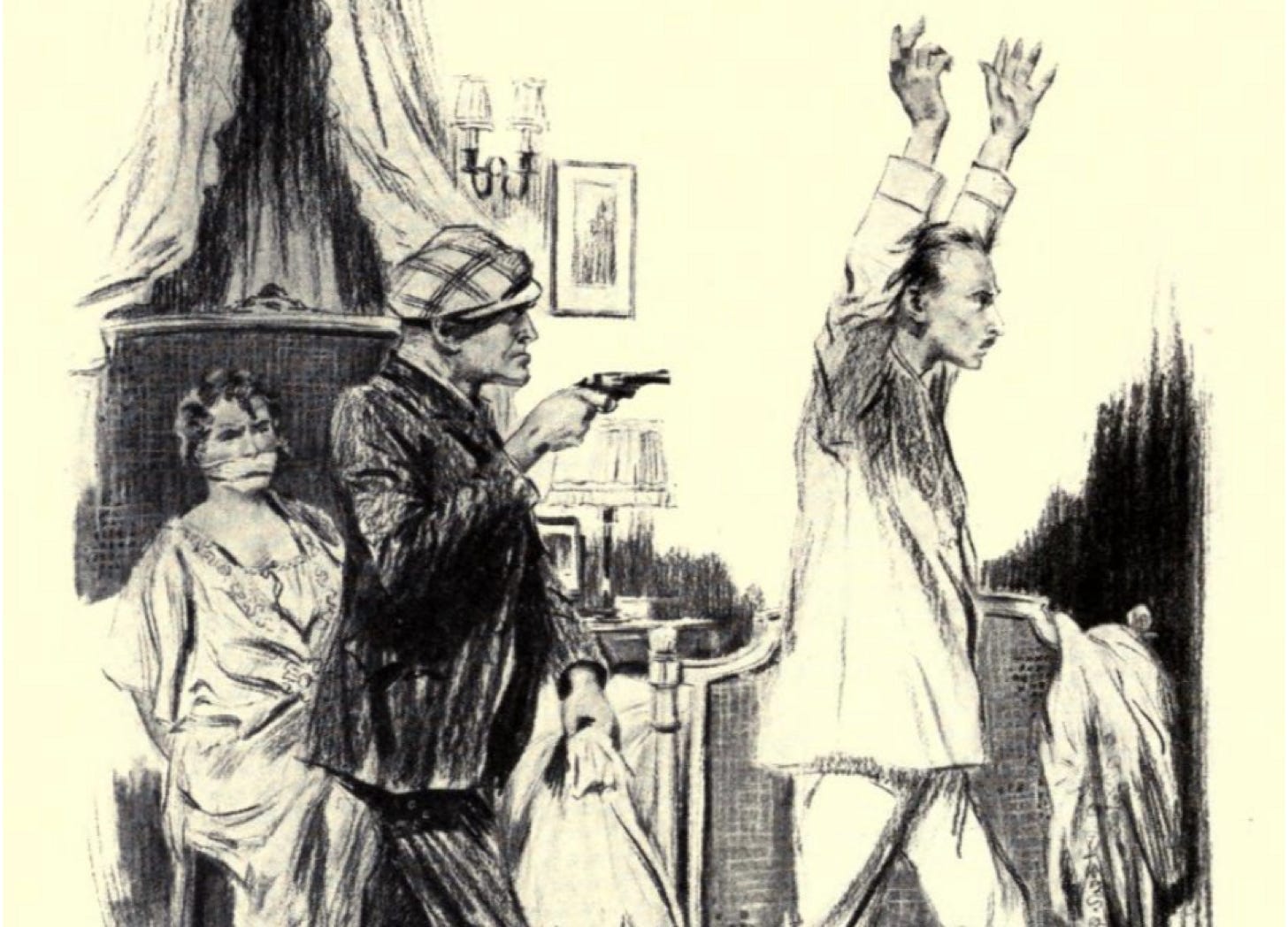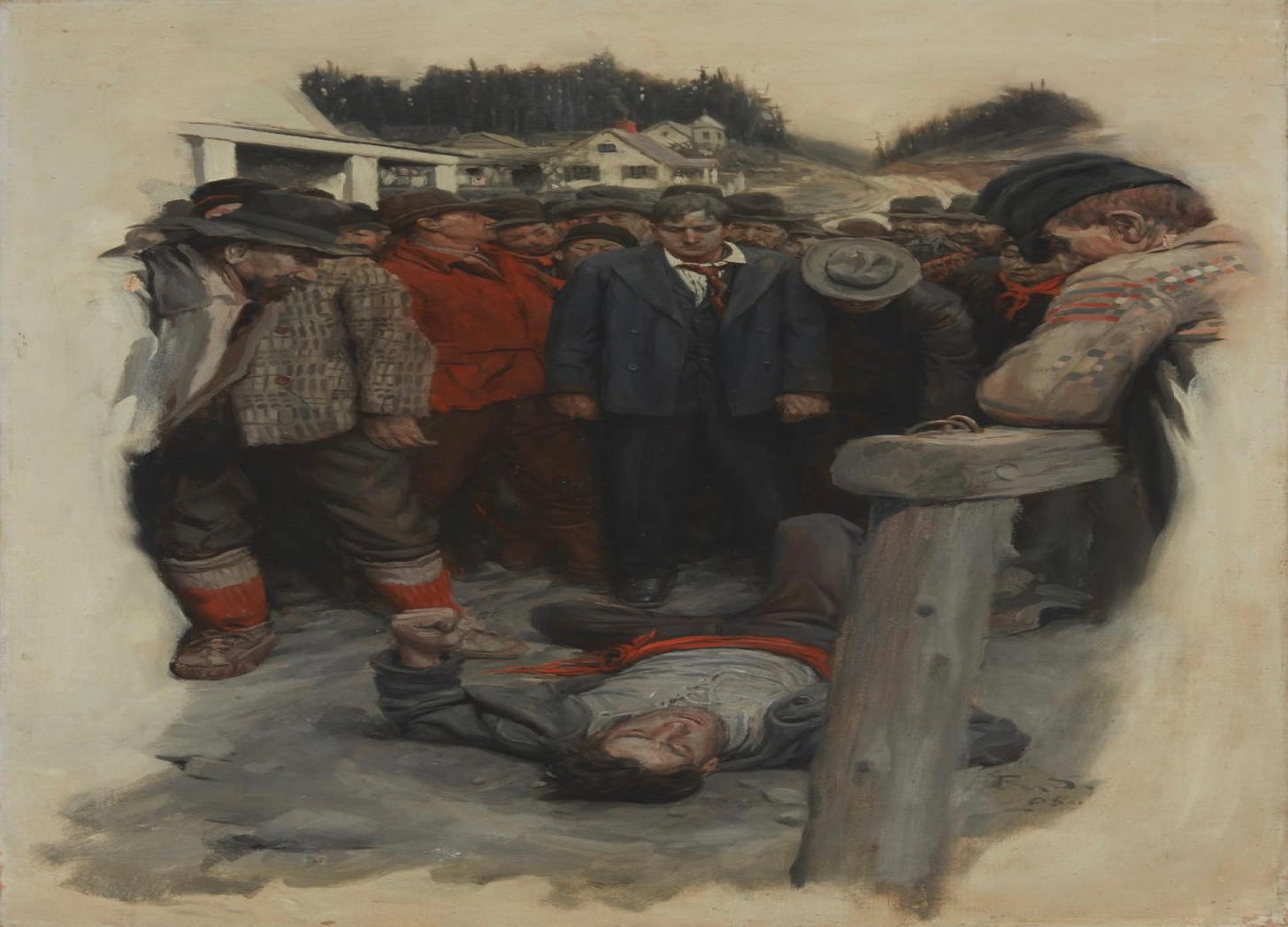What the Loggers Read
A first-hand report from 1927
In 1927, a short piece on the subject of the reading habits of men who cut down big trees appeared in a monthly called The Bookman. Not to be confused with its London-based Doppelgänger, this American magazine published articles of interest to people in the book business.
Speaking as a logger with several years of professional experience behind me, and as one with a high regard for the boys who cut the tall timber, I should like to say that loggers enjoy sound reading matter. I should prefer, for instance, to tell the literati that loggers fight over possession of a copy of The Atlantic Monthly; that they gouge out eyes in a scramble for a dog eared Harper’s; that they plant calked boots in the hams of the thief who removed The Century from the bunkhouse; and that they mass and give three rousing cheers when the tote team brings in the monthly supply of The Bookman.
But I can’t honestly make such a statement any more than could a spokesman for store clerks, barbers, traveling salesmen, farmers, or even captains of industry. Because of their extended isolation from moving pictures, Ford automobiles, bootleggers, and other things that distract the minds of people living near civilization, loggers do more actual reading than do most farmers or city dwellers. And on the whole I think the logger’s literary taste will compare favorably with that of his city cousins; while it is assuredly on a stratum that would reject the dismal farm journals.
In New England and the Lake States loggers, or lumberjacks, hibernate from late fall to early spring; many camps are busy throughout the year. In the Pacific northwest, where there is at present more logging going on than ever was seen in Maine, Michigan, or Wisconsin, the loggers emerge from the timber at Christmas time for a month or two, and again just before the Fourth of July. In camp there is ample time for reading. Long evenings and longer Sundays, when the only attraction is a poker game or a lecture by some often ignorant and long winded evangelist, present unusual opportunities to study the confessions of J. J. Rousseau, or to contemplate and marvel at the more recent, and possibly more erotic, ‘confessions’ prepared for morons and published in the nation’s intellectual capital.
Most loggers like their literary meat red. They want a story with black, curly hair on its chest and smoke and fire blowing forth from every chapter. During the long evenings in camp, when poker happens to be financially impossible and when chewing plug or snuff is the only amusement, loggers often crave to be somewhere else. How? ... Zane Grey . . . Jack London . . . Harold Bell Wright . . . and that feller who wrote Graustark. These are among the leaders of camp literature.

In New England and Quebec, and only there, Holman Day’s books are supreme with English-speaking loggers. Day wrote King Spruce, a tale of the northeastern woods with a hero in whose doings every incipient camp foreman has seen himself ideally reflected. I have bought and loaned three copies of this book.
In the Lake States and in the Pacific northwest, however, loggers strongly favor the ten-gallon hat, two-gun cowboy school of literature. There have been few novels written around the type of logging that prevails in the northwest, at least, and this fact may have some bearing on the loggers’ preference for red blooded frontier stuff.
Upton Sinclair is a favorite with the ‘radicals’. I have also seen on bunk-house tables — and showing signs of having been well read—a copy of Voltaire’s Life, Paine’s Age of Reason, and a volume of Thomas Jefferson’s Letters. The ‘wobbly’ papers (a wobbly is a member of the I. W. W.) are seldom seen in the camps any more. A few years ago every mail brought a large bundle of them into camp, but the organization appears to have fallen onto hard times and its publications seem tame and uninteresting when compared with those of the Golden Age of the I. W. W. [International Workers of the World].
In every logging camp I have ever known there was at least one man who, all things considered, might well be termed a bibliophile. At Grassy Bay in northern British Columbia we had a saw filer who qualified. Untainted by any schooling other than a few terms at a red schoolhouse in the backlands of Texas, he owned a library that attracted every semi-educated savage among us. To the intelligentsia, of course, this filer’s collection of books would have appeared banal. But neither I nor the other customers had even heard of the intelligentsia and we found a great deal of good in the filer’s bookcases, which were made from the long, narrow boxes in which crosscut saws had been shipped. This rough library kept me in good reading matter throughout the longest seven months’ period I ever experienced.
The library ran across two sides of the front room of his shack. There were five boxes on each side, crammed with volumes. On the north wall was a very good steel-cut [engraving] of Voltaire. Facing the great philosopher was a halftone of [William Cowper] Brann ‘the Iconoclast’. Today Brann is largely forgotten, but in the nineties he achieved fame as editor of The Iconoclast, a Texas ‘weekly of opinion’ which had wide circulation. The paper lived up to its name and Brann was shot on the streets of Waco and died with his boots on.
The only other picture in the room was a horrible chromo of Jim Fiske, done in four colors.
This saw box library contained as wide a range of reading as I ever saw in one place. Brann, complete in ten volumes, was prominent. Dumas, complete, took up an entire shelf. Both Darwin and Huxley were represented, and this long before the Scopes trial brought them to the attention of the literate but unread. A full calf edition of the Encyclopedia Britannica was piled up on the floor. A fat tome labeled The Plays of Euripides had been well thumbed. Billy Baxter’s Letters, written, if I remember aright, for Red Raven Splits, brought one quickly from Greece to Chicago.
In the other stack of saw boxes I remember seeing a volume devoted to the life and works of [the occultist Alessandro] Cagliostro. Next to it, by chance or design, was a copy of Moody and Sankey hymns. Monsieur Fournier’s exposition of economics occupied the same shelf. Charlotte Bronté, Carlyle, and several volumes of Dickens were there.
In western Washington, in the tall Douglas fir country, I know a lumber-jack who has and reads Plato. He knows the massive Gibbon’s Rome from cover to cover. Poe is there; and Thomas Hardy. And close to a thousand volumes ranging from Catullus to Elbert Hubbard. When on a recent visit I stopped to consider that any one of a large number of these books represented one day’s wages of the owner — $3.80 — it gave me food for thought.
Along the Quebec-New Hampshire border there was, and possibly still is, a lumberjack who loaned me Gil Blas, Don Quixote, Rabelais, and Rousseau’s Contrat Social.I also borrowed from him a set of Wilkie Collins The Moonstone was the first book to keep me awake all night; and the goings on of Gargantua were the only goings on that made me laugh aloud in a shack so cold that I went to bed in my underwear, socks, outside shirt, and trousers. From this same library I learned of the loves and troubles of Signore [Benvenuto] Cellini [the Italian sculptor, goldsmith, and writer]. My librarian chewed tobacco and played an accordion by ear. If I were sure of his address I should send him a pound of plug and a copy of Queen Marguerite’s Heptameron. (He once told me he had looked long and wide for the tales.)
Magazines are more in evidence in logging camps than are books. Adventure is first in fiction of a kind, and Popular Mechanics runs it a close race for general circulation. Vicarious travel is accomplished in the pages of The National Geographic Magazine, one of the most popular publications in any camp. Following these comes a long line of cheap fiction magazines, all of the red blooded school, and several movie magazines. I have known many young loggers who write letters to the editors of the movie sheets, requesting information regarding the ages, color of hair, religious persuasions, and favorite corespondents of the various picture stars.
Despite its wide circulation in urban and bucolic districts, The Saturday Evening Post has never been prominent in the woods. It is not so widely read as is the noisier Liberty. The large prize offers of the latter have the loggers agape, as they have many other people, although I have never known a logger to write a title for an unnamed cover or the last line to a limerick, They get their five cents’ worth of thrill from contemplating what they would do with a prize of $10,000 or $40,000, or whatever it is.
A monthly pamphlet devoted chiefly to pornographic allusions and to stories that drummers tell to paretic customers is occasionally brought into camp by the young bloods or the senile bull cooks (men of all work). Richard K. Fox’s crowning glory, The Police Gazette, is seldom found in bunkhouses. Its pink pages of burlesque queens can hardly hold their own alongside a journal the masthead of which proclaims that here is Wedding Bells: The Matrimonial Journal That Gets Results. Without a copy of Wedding Bells no camp is complete. One finds it in the Kennebec woods, the Saginaw country, and in the great Oregon timber.
Wedding Bells is published, according to an announcement by its obviously idealistic editor, in order ‘that worthy men and women who are lonely for life mates, may become acquainted with each other’ through its columns. It accomplishes this laudable purpose by printing halftones and self written descriptions of generally fat but roughish appearing females who are advertising the fact that they want a man. Nothing but the pictures and descriptions (which appear unduly optimistic) is given in the pages. On close application one learns that for two dollars one may receive a list of addresses of any six of the female marvels advertised. Correspondence and ultimate marriage, it is intimated, will follow such action. How many matches are made through the columns of this paper and its many contemporaries I have no way of knowing, but the number is greater, I feel sure, than most people would believe.
This closing picture of what loggers read is melancholy, but it is not meant to be general. Only one or two men in a camp take the matrimonial journals seriously. And this percentage is nothing when compared with the ever increasing numbers of city readers who are becoming addicted to ‘confession’ and other sex magazines.
Then, too, the loggers who do read the matrimonial journals get more for their reading than do readers of the ‘confession’ drivel. The loggers learn to write, or improve their writing; far away correspondents in strange cities cause them to think about geography; and many of the ladies they write to are old enough to teach history.
Even when the logger doesn’t read sound literature he learns something.
Source: Stewart H. Holbrook ‘What the Loggers Read’ The Bookman (July 1927)
For Further Reading:
To Share, Subscribe, or Support:






This evokes a feeling of nostalgia for a time and place none of us have ever known.
Paperback classics often have the best page to price ratio, and therefore are an excellent purchase for someone who's going to be away from a bookstore for weeks or months at a time.